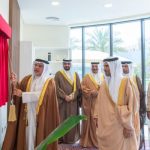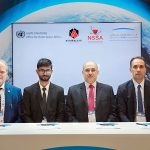A collaborative effort between two nations culminates in the region's first gamma-ray flash project.
 The UAE and Bahrain are set to launch a nanosatellite to the International Space Station on December 21. It represents a major milestone of cooperation in space science, technology and engineering between the UAE and Bahrain.
The UAE and Bahrain are set to launch a nanosatellite to the International Space Station on December 21. It represents a major milestone of cooperation in space science, technology and engineering between the UAE and Bahrain.
Light-1 will take off onboard a SpaceX CRS-24 flight onboard a Falcon 9 rocket after undergoing safety and environmental tests for thermal and vibration, communication systems and more. The nanosatellite will be deployed from the Japanese Experiment Module (KIBO) in the ISS into orbit, supervised by the Japanese Aerospace Space Agency (JAXA).
The nanosatellite was built and designed in collaboration between the UAE Space Agency and Bahrain’s National Space Science Agency (NSSA), the project was executed at Khalifa University and New York University Abu Dhabi. It is a testament to the bilateral ties between the Kingdom of Bahrain and the UAE, underscoring the social, economic and scientific cooperation between both countries in priority industries, including space.
It is also a cube satellite that consists of three units and is often referred to as a 3U CubeSat.
Light-1s name was inspired by HM King Hamad bin Isa Al Khalifa, King of Bahrains book, The First Light. It recounts key points in Bahrain’s history and the name symbolises the countrys growth and scientific progress.
The research spacecraft was developed by Bahraini and Emirati engineers and scientists working from labs in the UAE. The team is made up of 23 students, including nine Bahrainis and 14 Emiratis from Khalifa University and NYU Abu Dhabi.
After reaching its orbit around Earth, Light-1 will monitor and study terrestrial gamma-ray flashes (TGRs) from thunderstorms and cumulus clouds. TRG analysis is an emerging field of geoscientific research which the mission will contribute to at an international level. It will be the first study of its kinds in the region. New York University will be leading the science data analysis aspect for this mission.
In addition to the joint Light-1 satellite, the Khalifa University of Science and Technology in Abu Dhabi supports the capacity building of NSSA staff by including them in key projects. This has helped train and upskill talent in space field.
The partnership between the UAE Space Agency and NSSA will also see the UAE Space Agency participate in the Bahrain International Airshow 2022. In which an agreement was signed by Sarah bint Yousef Al Amiri, UAE Minister of State for Advanced Technology and Chairwoman of the UAE Space Agency, and His Excellency Eng. Kamal bin Ahmed Mohammed, Minister of Transportation and Telecommunications and Chairman of the NSSA at the Dubai Airshow 2021.
















































































